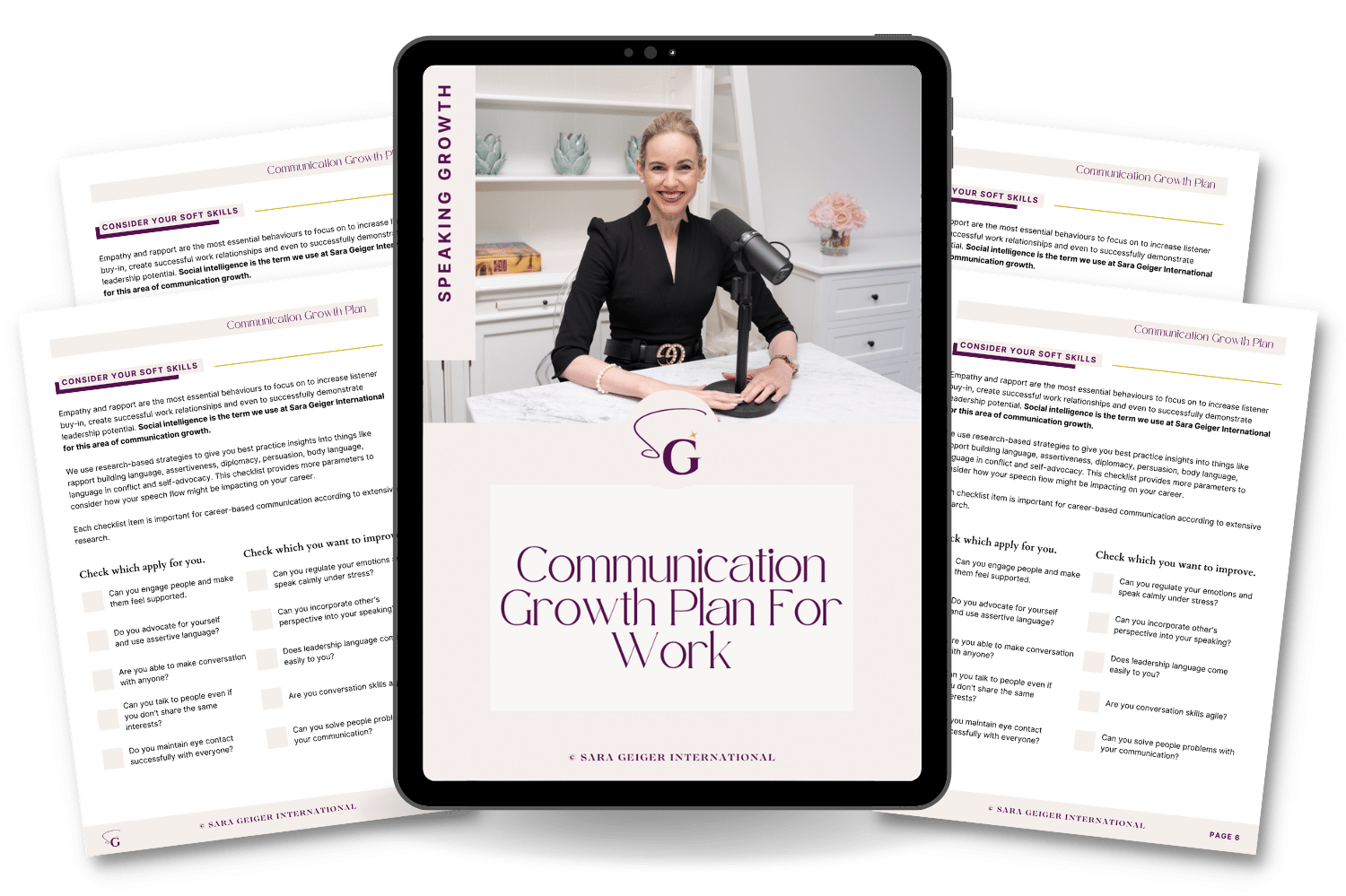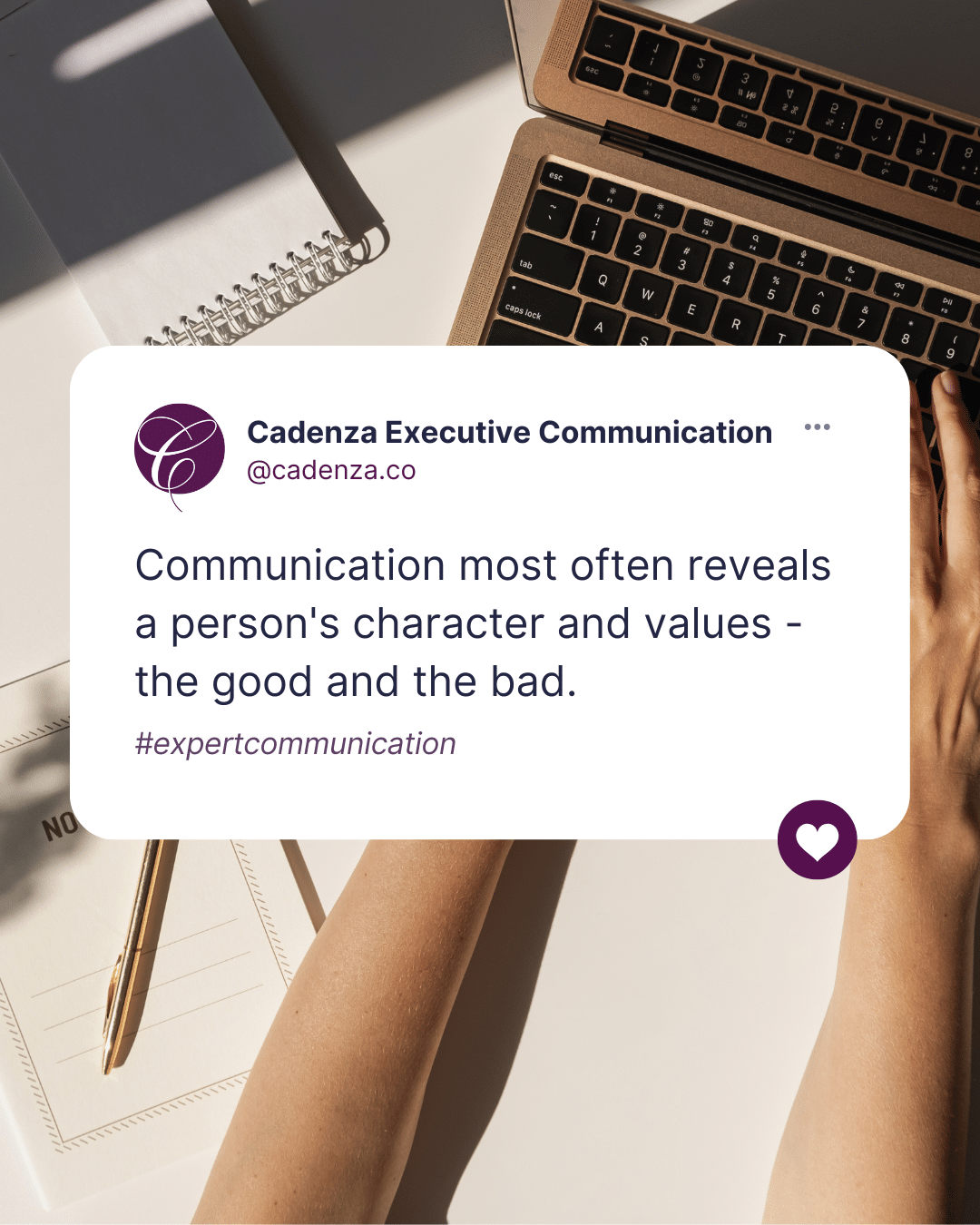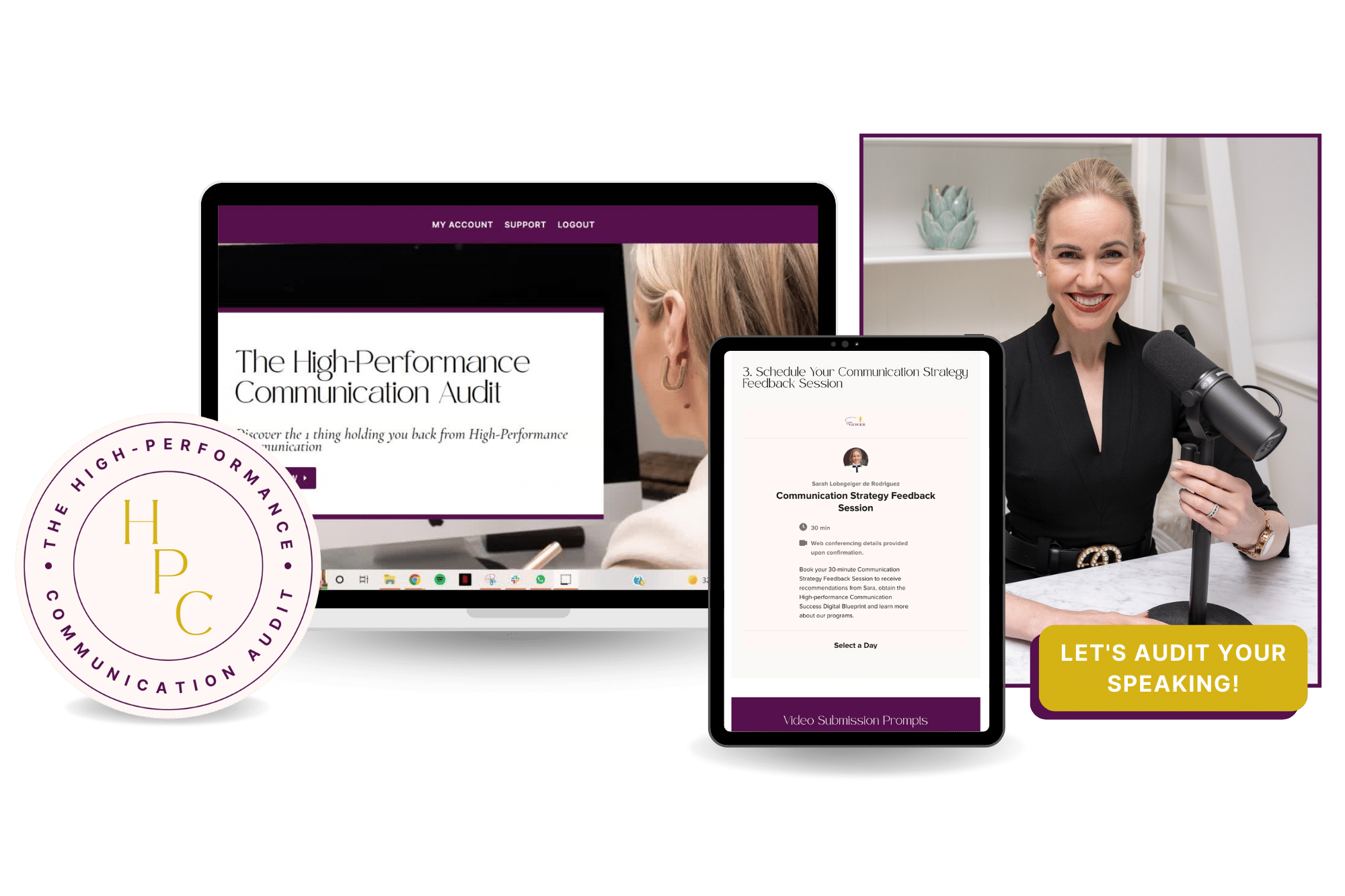Social Intelligence
3 Principles to Improve your Interpersonal Skills
Social Connection is Key

Interpersonal skills are crucial to making friends, being a spectacular team player and bossing up with empathy if you run a small business or work in a leadership role. However, confident communication can be hard to master across different environments, so if you struggle to build a relationship at work or make small talk in the office, watch this video.
I’m going to show you three interpersonal communication principles that can change your rapport-building skills for the better. Consider applying these principles in your personal and professional dealings to gain high level rapport.

CLAIM YOUR COMMUNICATION GROWTH PLAN FOR WORK
A science-based fillable self-assessment that helps you leverage and improve your speaking at work.
If you want to increase your speaking confidence, level up your interpersonal skills
Your ability to apply emotional intelligence in your dealings will make you.
Don’t let your talking worries get you down. Instead, why not switch your focus and find strategies that build your interpersonal abilities & soft skills?
“Excellence is not a skill, it’s an attitude” (Ralph Marston), so with a positive attitude, you can become superb at speaking to anyone, no matter how confronting it feels.
These things count- a listening ear, words of support, genuine praise and gratitude, a helping hand, and a thoughtful expression of encouragement.
Watch This First
Suppose you’re deeply concerned about building rapport and social connection. In that case, my tutorial covers a list of interpersonal skills to incorporate into your Big Interpersonal Communication goals that will change your speaking life.
Remember, confident speakers identify stressful speaking settings and apply concrete goals to increase their success.
Sometimes, straightforward reminders are the most powerful tools to develop your interpersonal skills. A sincere smile, for example, goes a long way.
1. The Principle of Liking
We communicate more comfortably when we like the person we’re speaking to.
People are more likely to like you if you like them.
How to apply this now?
- Look for things you share with that person – values, attitudes, interests, tasks, and the same city. Dig deep! You may connect more with a conversation partner if you can generate creative conversation topics.
- Affirm the person sincerely.
- Engage in informal conversations in the workplace to learn more about your contact’s interests. Seek to build connections and bonds via thoughtful conversation topics and questions.
Sometimes you might have to dig deep to find likeability, but it’s worthwhile if you’re stuck with that office colleague, boss, tricky client, or even flatmate. Our personal lives and working environment are richer when we apply the principle of liking. So aim for an authentic and genuinely interested manner.

2. The Principle of Reciprocity
People will give to you if you give to them, so give what you want yourself. For example, if you smile at someone, they will usually smile back.
How to apply this now
- In the workplace, find ways to give your team members your time, your listening ear, your words of support, and praise. And remember your boss too. Bosses also need words of sincere support and encouragement.
- If you run a business, share your knowledge and give value. Don’t cold call and ask if you’ve yet to offer something first. Be careful with giving out freebies, though, as this can reduce your value, but if your clients have chosen you, it’s important to shower them with the most value you can offer. You won’t be disappointed. Instead, you’ll notice successful stakeholder relationships.
- Building relationships with stakeholders and clients results from successful interpersonal communication supported by incredible products and well-thought-out services.
- Mirroring techniques with body language are another way to build an impression of mutuality and are a common device used by individuals with strong people skills.
- Active listening skills are also a good way to practice reciprocity.

3. The Principle of Consistency
If you’re committed, people will support you better. So present yourself with a consistent approach to harness and build trust.
How to apply this now
- Communicate with commitment and consistency.
- Accountability determines how solid your interpersonal skills stack up. Give specific time frames that people can expect to receive information from you if they are waiting on something, and make sure you meet them.
- Don’t “ghost” prospects, contacts, or friends. Instead, be specific and predictable in your follow-up. Waiting in limbo for information creates anxiety for most people, especially new prospects, so ensure you have a detailed communication strategy to protect rapport and trust.
- Writing your commitment down or speaking it aloud is also helpful if you promise something. You can create a process where you follow up with an email or a written note or include following-up conversations with a summary email outlining what your contact can expect. When you meet it, your employees, friends, or prospects will feel valued, and you will build rapport.
People will notice your precision; consistency is a reliable way to garner trust with your important contacts and as a team member.
Social Skills are Social Intelligence
There’s a massive array of acceptably diverse interpersonal communication in the corporate sector.
We know that homogenous workplaces tend to lack innovation and engagement, not to mention emotional intelligence.
Just because someone interacts differently from you does not mean they have weak interpersonal skills. It just means you must work harder to create mutuality and authentic conversation. A test of your social intelligence will be if you can challenge yourself to integrate with people who do it differently.
Different is not wrong.
Effective communication is all about working intentionally at how you interact with other people. The best way to improve your interpersonal skills is to be very intentional- commit to learning and developing your interpersonal skills. Consider a communication skills program to gain rapid improvement.
How to present with impeccable interpersonal skills with customers & clients
If you’ve just found yourself in a difficult situation with a customer, client or even stakeholder, I’ve prepped more tips for you.
🔗 How to Successfully De-escalate an Angry Customer or Client
Angry customers will pique any business owner’s fear, and the risks can be high if you cannot resolve conflict with your clients or stakeholders. Check my tips here.
How to use top-level interpersonal skills to cope with a toxic boss or colleague
A key way to increase your sense of worth and expertise at work is to build better interpersonal skills for boundary protection.
The first step to responding to toxic communication at work is to recognise the defunct communication your problematic contact uses to control or oppress you.
This article will build your ability to spot toxic communication behaviours, the first step to prepping the best response.
🔗 How a Toxic Boss Uses Verbal Aggression to Poison & Overpower
Find out how to spot the signs of a toxic boss and what you can do to boost your confidence and plan the best course through the process or out of the role.
How to leverage interpersonal skills to cope with difficult colleagues
If you’ve ever had to work with a challenging, abrasive, arrogant or aggressive person, you’ll want to think about the interpersonal skills you need to deal more effectively with complex colleagues.
🔗 Do you know the 4 styles of Verbal Aggression that can Sabotage you at work?
Learn tips on how high performers handle verbal aggressiveness with elegance at work.

Mastering Self-Awareness and Leadership: The Essential Soft Skills for Success
In the age of automation and the new dawn of artificial intelligence, no one can afford to avoid investing in their interpersonal communication skills.
Today I want to share a definitive guide so that you can start envisioning communication goals that will protect your career and reputation at work and ensure that you have the upper hand in case a robot revolution is imminent ????????.
But in all seriousness, here’s what I’ve prepped for you:
- The definitive list of leadership soft skills that keep you relevant & relatable, which will grow your influence and impact in a competitive workplace
The best leaders can manage themselves. So here’s your chance to investigate growth areas and gain strong interpersonal skills to enhance your credibility, improve your people and influence the greater good.
🔗 32 Leadership Soft Skills that will Protect your Value at Work
A great resource for prepping for job interviews, your next job application, covering letter or even writing a job description for a new hire.
Well, there we are! Hopefully, this article has helped you get started with problem-solving your social and work-orientated communication.
We’ve now laid the foundations to consider aspects of interpersonal communication to pay more attention to.
Rapport-building skills and social skills are vital to career and personal success. Therefore, emotionally intelligent communication strategies are a core aspect of my modern Elocution program.

Want to learn more interpersonal communication skills to amplify your success?
If you want to improve your communication, you need to know this:
6 basic bottlenecks can hold you back from clear and confident communication.
But, if you learn your #1 bottleneck, you can fix it.
Solving this problem for clients worldwide is what I do all day, every day, through my modern elocution services.
So, discover your critical bottleneck that’s holding your confident speaking back- see more info here.
Did you enjoy this post? Make sure to subscribe to our YouTube channel to get more content to increase your communication skills!
References
- Cialdini, R. (2001). Harnessing the Science of Persuasion, Harvard Business Review
- Persuasion and Influence or Genuine Connection and Rapport – Centre for Research and Evidence on Security Threats. Crestresearch.ac.uk. (2020). Retrieved 12 May 2020, from https://crestresearch.ac.uk/comment/persuasion-and-influence-or-genuine-connection-and-rapport/
- Sugawara SK, Tanaka S, Okazaki S, Watanabe K, Sadato N (2012) Social Rewards Enhance Offline Improvements in Motor Skill. PLoS ONE 7(11): e48174. https://doi.org/10.1371/journal.pone.0048174 Retrieved from https://journals.plos.org/plosone/article?id=10.1371/journal.pone.0048174
- The Language of Persuasion. Harvard Business Review. (2020). Retrieved 13 May 2020, from https://hbr.org/2008/02/the-language-of-persuasion.html.
About the Author
Dr Sarah Lobegeiger de Rodriguez is a Keynote Speaker, Executive Speaking Coach, and Opera Singer who likes to play with words, sounds, and your impact.
Her academic background is in Music Performance, Communication Science and Speech & Language Pathology. She assists executive communication clients all over the world as a communication consultant with strong expertise in CEO, Founder and Entrepreneur communication strategies.
Connect with Sarah on LinkedIn.
© CADENZA
Level 14, 380 St Kilda Road, Melbourne, 3004
Privacy Policy
Terms & Conditions
Position Statement on Racism
